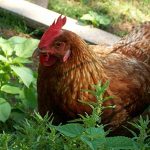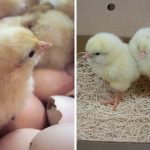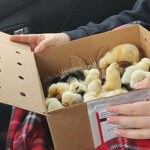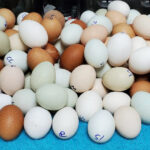
The natural color of wild duck eggs is greenish or bluish. That’s because eggs with tinted shells are easier to hide from predators. Many consumers, however, prefer eggs with white shells, presumably because white represents purity. Eggs with Blue-Green Shells Wild mallards lay eggs with blue-green shells. Domestic Mallards usually lay eggs with blue-green shells, […]
Continue Reading

Blackhead is a serious disease of turkeys. Histomonas meleagridis protozoa cause the disease, leading to its technical name: histomoniasis. Histomonad protozoa occur in nearly all poultry environments, except where the soil is dry, loose, and sandy. A turkey gets blackhead when histomonads lodge in the bird’s ceca, or blind intestinal pouches. From there they migrate […]
Continue Reading

What you can do when a egg layer stops laying depends on the reason she stopped. A hen may take a break for a great number of reasons. Once you determine the reason, you may be able to take measures to get her back on track. So let’s look at possible reasons why your egg […]
Continue Reading

When you are ready to raise a batch of baby chicks, should you buy chicks or hatching eggs? Each option has advantages and disadvantages. So how different is it when you start with eggs versus chicks? Starting with Eggs When you start with eggs that you plan to hatch, the first thing you need is […]
Continue Reading

FREE SHIPPING on all supply order totals exceeding $25.00.
Continue Reading

Crazy Chicken Lady Starter Kit
FREE SHIPPING
Continue Reading

Turkeys are much bigger than chickens and therefore would seem to be unlikely as companion animals. Nonetheless, they are becoming ever more popular as outdoor pets. Here are some reasons why turkeys make good pets: Why Turkeys Make Good Pets A turkey makes a good pet for many of the same reasons a cat or […]
Continue Reading

No trip through Missouri would be complete without a visit to Cackle Hatchery®. The facility is not merely a mail-order poultry hatchery. It also operates a year-around poultry-only products store and museum, and sponsors a popular annual chicken festival. The best time of year for you to visit depends on your purpose and on the […]
Continue Reading

Baby chick ship dates and Cackle Hatchery® store pickup dates change with each calendar year. For this year’s ship dates, consult our Chick Season® calendar. Chick Ship Dates We hatch and ship baby chicks from February through September. To avoid weekend layovers at the post office, we ship on Mondays and Wednesdays. We make exceptions […]
Continue Reading

Potluck Ultra Rare Special Hatching Eggs
FREE SHIPPING!
Only sold in 12 or 24 Pk
No Pick up orders
Eggs need to be placed on a separate order and not with other birds. The egg orders are manually scheduled and you will receive your notice of your ship date within 24 to 48 hours.
Continue Reading










